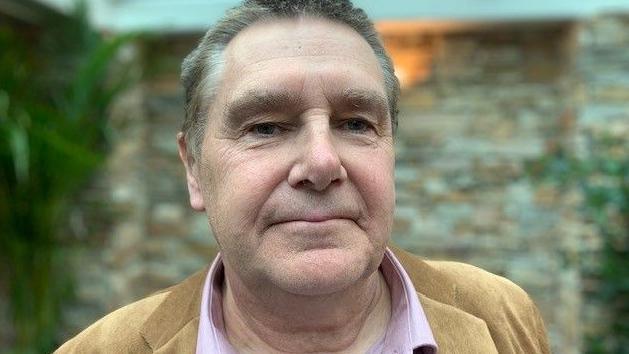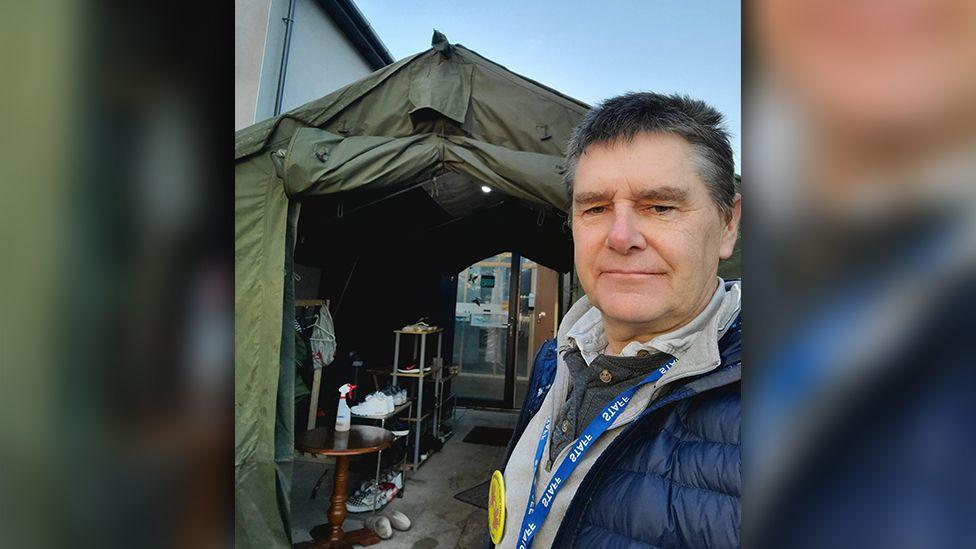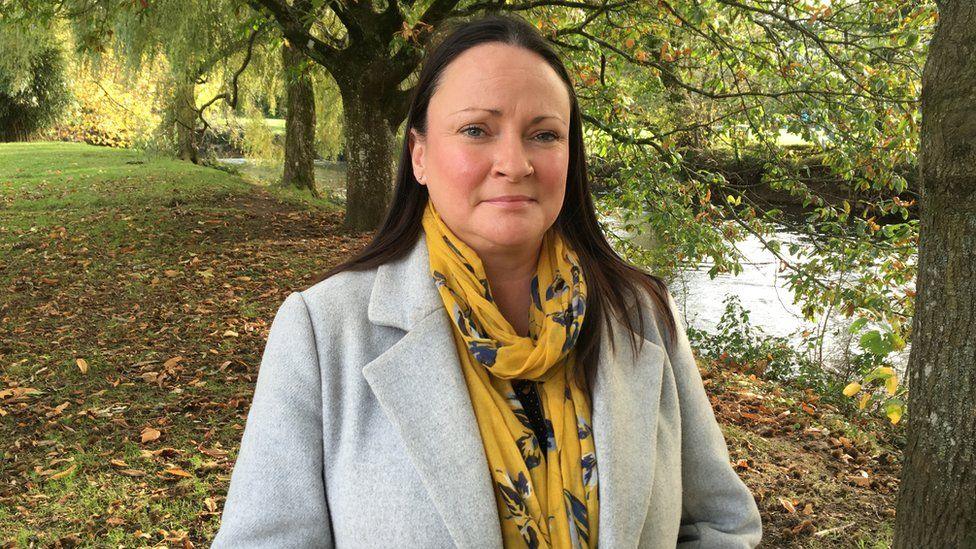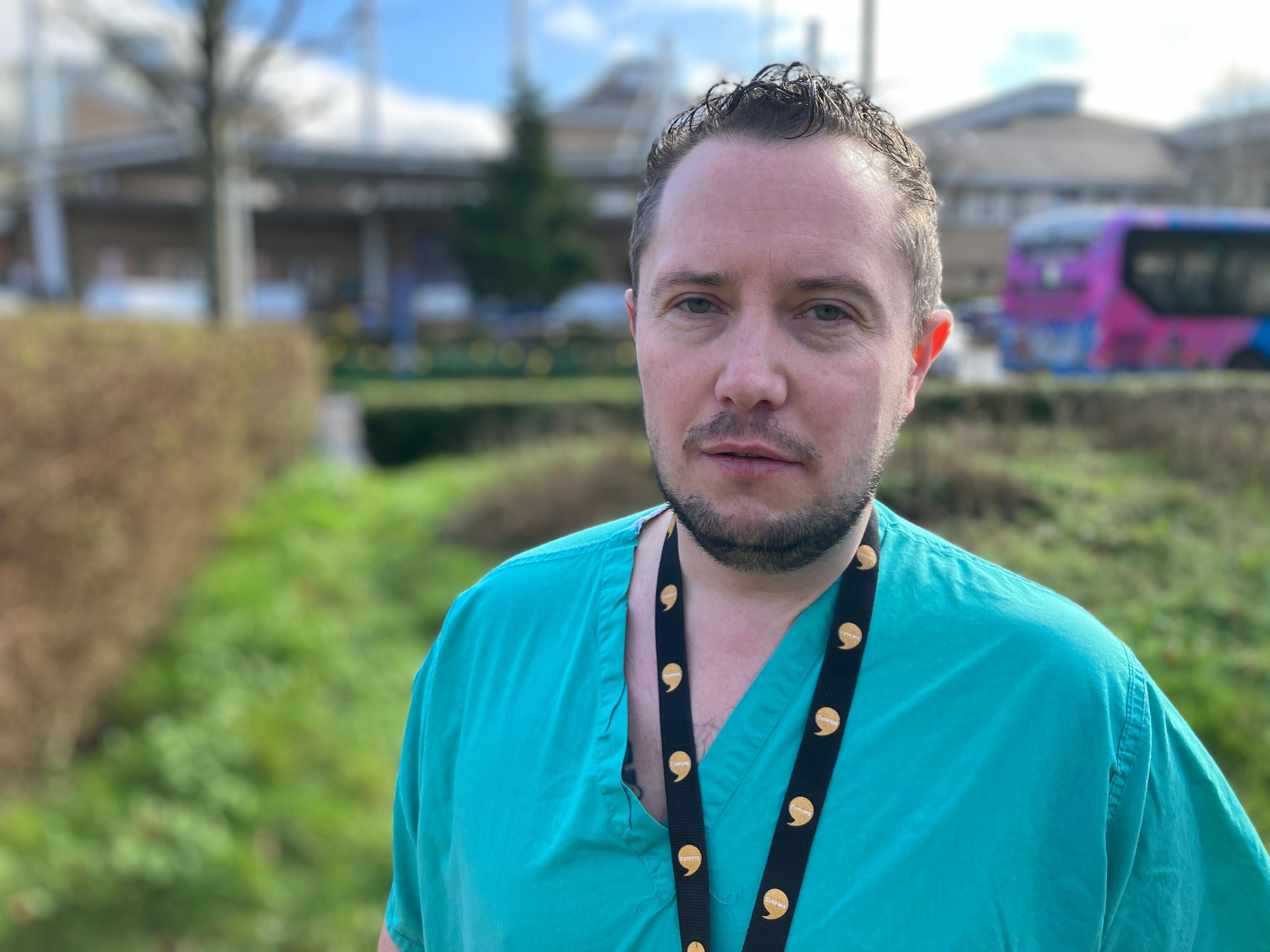Government accused of 'ducking and diving' Covid questions

Glyn Williams wants government investment in the care sector to prepare for the next pandemic
- Published
Officials in Wales ducked and dived their way through the Covid inquiry and have not learned the lessons of the pandemic, a care home owner has claimed.
As the UK Covid Inquiry's three-week Wales module drew to a close on Thursday, Glyn Williams, from Anglesey, said: "The Welsh government are not admitting that they've done something wrong.
"In order to learn you've got to admit that they're mistakes, instead of just ducking and diving."
The inquiry heard evidence from politicians and officials, with First Minister Mark Drakeford likening then Prime Minister Boris Johnson to an "absent football manager" during the pandemic.
Miranda Evans, from Bridgend, who lost three relatives to Covid, said the inquiry had highlighted the need for a Wales-specific investigation.
The Welsh government said its "thoughts and sympathies are with everyone who lost loved ones during the pandemic".
Missing messages 'a real embarrassment' - Gething
- Published11 March 2024
'Wales felt like second-class citizens in pandemic'
- Published12 March 2024
Mr Williams, who runs Gwyddfor Residential Home in Bodedern, Anglesey, said the care home sector was "left on our own" by the Welsh government, with no PPE, testing facilities or clear guidance.
He spent 25 years serving with the Royal Air Force and in 2020 used his previous training in biological and chemical warfare to safeguard the care home by building his own decontamination facility.
He said: "What we have to remember is that a lot of the people that are in the sector now, probably won’t be in the sector for the next pandemic. And so we have to rely on the governments preparing now for it, and then future governments to be following up and running scenarios on the next pandemic.
"We were fortunate that fantastic scientists produced a vaccine. If they hadn’t been able to do that, where would we be now? Maybe with the next pandemic we might not be so lucky.
"Until the governments admit their mistakes, we’re not going to get anywhere, I don’t think."

Glyn Williams built his own decontamination centre at his care home
Mr Williams said he had seen no evidence of the Welsh government investing to keep care homes safe from future pandemics.
"Just listening to them at the inquiry, it’s obvious that they’re just ducking and diving the important questions that need to be answered so that they can learn lessons," he said.
The inquiry in Cardiff heard how Wales' chief medical officer Sir Frank Atherton described the handling of the pandemic as an "omnishambles".
Mr Williams said: "That summed it up for me."

Miranda Evans believes deleting messages appears "sneaky"
Miranda Evans, 45, from Bridgend, lost her aunt, uncle and grandmother after they contracted Covid in hospital.
She said evidence heard in Cardiff showed a "lack of preparation" from the Welsh government, and furthered the need for a Wales-specific inquiry.
"I think it's actually highlighted the need for it even more, because some of the issues that have unfolded from this have been Wales-specific," she said.
While she welcomed the session in Cardiff, and believes ministers "had a grilling," she said areas needing further investigation included a lack of communication and transparency within the Welsh government itself, and between Wales and Westminster.
She said there was "a lot of distrust from people... they don't believe that it's actually going to make any difference, this inquiry, and it's all just hot air and pretense".
A dedicated Wales inquiry would prove the last three weeks had not just been a "tokenistic exercise," she said.
Another subject that needs to be further explored was the deletion of WhatsApp messages, she said.
The inquiry heard how WhatsApps had been deleted from the phone of Wales' former health minister Vaughan Gething.
Previously, the inquiry heard how former first minister of Scotland, Nicola Sturgeon, appeared to have retained "no messages whatsover".
Ms Evans said: "Why was that happening? Why was there a need to delete those messages?
"I instantly think they're covering their backs. There's obviously something in those messages they didn't want anyone to see, or they didn't want to come out in future months, years, and reflect badly on them.
"I just find that quite a sneaky thing and it makes me feel uncomfortable."

Dr Dai Samuel hopes lessons will be learned, and more training provided
Dr Dai Samuel, consultant hepatologist at the Royal Glamorgan Hospital in Llantrisant, vividly remembers the height of the pandemic, when he and colleagues were seeing multiple patient deaths every day.
Dr Samuel said the NHS suffered a significant "moral injury" and some health professionals are now saying “I can’t keep going”.
"I think the pandemic relied on a lot of goodwill… I think that goodwill has run low now, and having to re-pick up the NHS as it was pre-pandemic is proving very difficult because of that," he said.
He added: "I think we need to learn from what was right and what went wrong and use that to plan for even better responses in the future when the next pandemic hits.
"And as doctors, we’re never trained in this type of scenario. Yes, we do roleplay but we’ve never learned how to manage a pandemic. So certainly as doctors, nurses and other healthcare professionals it’s something we can certainly take away from this and look to improve on going forward."
The Welsh government said in a statement: “Full scrutiny of the decisions made by Welsh ministers and Welsh public services, together with their interconnected nature with those taken by other UK governments, can only be achieved by a comprehensive UK-wide inquiry.
“Over the past three weeks, ministers and officials have been giving detailed evidence to module 2b of the Covid-19 public inquiry, and we have provided over 35,000 documents and 100 statements for consideration.
“We look forward to receiving the inquiry’s final report and recommendations in relation to this module, which will help ensure we learn lessons and are better prepared in the event of a future pandemic.”